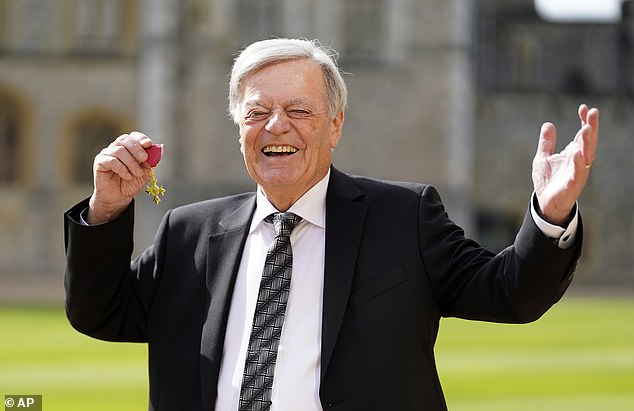Tony Blackburn, a veteran DJ, recently admitted that he made up the claim of sleeping with 250 women before marrying his wife Debbie in 1992. In his 1985 autobiography, Blackburn stated this number to add more salacious details, but he now acknowledges that it was an exaggerated figure. He also mentioned that he did not read the book before it was published and regrets including this false information. Despite once being known as a charming man in swinging London, Blackburn now clarifies that the number of sexual encounters he had was not accurately portrayed in his autobiography.
After meeting his second wife Debbie in a pantomime he starred in, Blackburn married her a decade later. They have a daughter, Victoria, who is 27 years old. His first wife, Tessa Wyatt, with whom he was married from 1972-77, had a son named Simon who is now 50 years old. Blackburn mentions that he has no plans of retiring and recently aired his final BBC local radio show after 43 years. Despite this, he will continue to present ‘Sounds of the 60s’ and ‘Tony Blackburn’s Golden Hour’ on Radio 2 during weekends. He expresses his passion for work, stating that he cannot stand the idea of not working and wants to continue engaging with his audience.
Blackburn’s admission regarding the fabricated number of his sexual encounters sheds light on the pressure celebrities often face to reveal personal details for public consumption. It highlights the temptation to embellish stories for entertainment value and the challenges of maintaining a public image. The DJ’s honesty about this matter reflects a shift towards transparency in the entertainment industry, where celebrities are increasingly sharing authentic narratives with their fans. Blackburn’s acknowledgment of the falsehood in his autobiography underscores the importance of integrity and truthfulness in storytelling, even in a showbusiness context.
The revelation about Blackburn’s fabricated claim also raises questions about the portrayal of celebrities in autobiographical works and the blurred lines between reality and fiction in such accounts. It prompts a discussion about the responsibility of public figures to present accurate accounts of their lives for the sake of their legacy and reputation. This incident serves as a cautionary tale for celebrities who may feel pressured to conform to certain narratives or expectations in their autobiographies, highlighting the importance of staying true to one’s experiences and values when sharing personal stories with the public.
Blackburn’s decision to set the record straight about his past experiences reflects a sense of accountability and self-awareness, as he acknowledges the impact of his words on his public image. By clarifying the falsehood in his autobiography, he takes a step towards greater transparency and authenticity in his storytelling, demonstrating a willingness to address mistakes and misrepresentations. This episode serves as a reminder of the complexities of celebrity persona and the delicate balance between maintaining privacy and engaging with fans through personal narratives. Blackburn’s candid admission offers a valuable lesson in navigating the demands of showbusiness while staying true to oneself and upholding honesty in storytelling.


